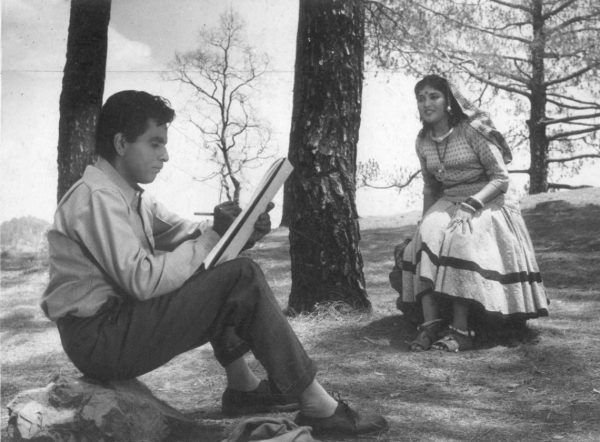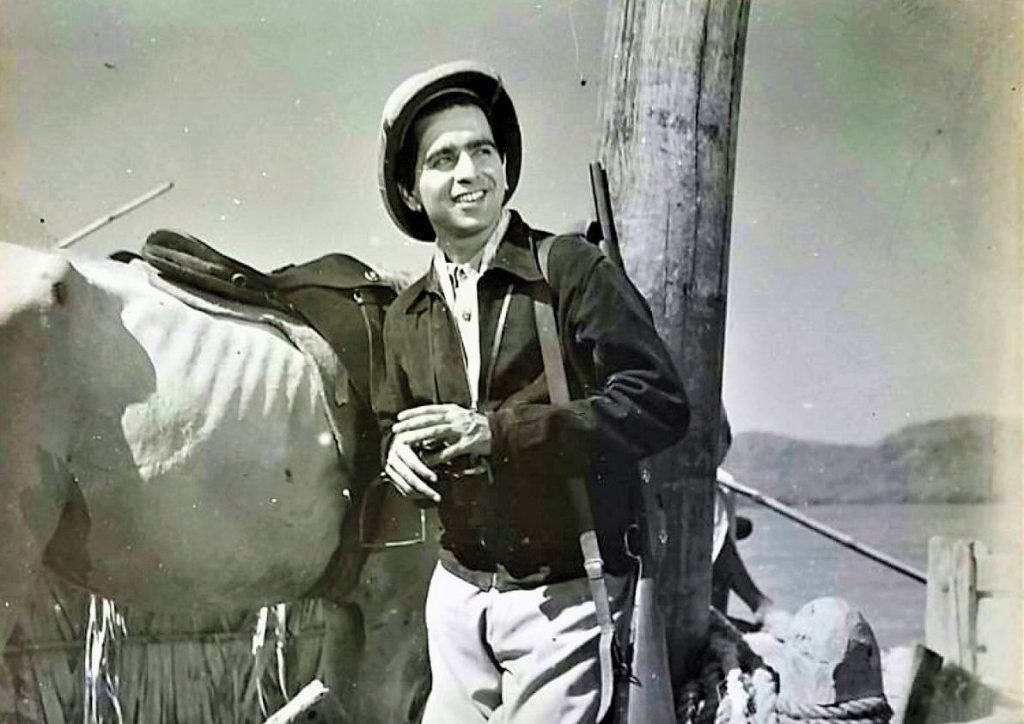It was his cadence that gave so many of us a first inkling of the strength called for to live through the ceaseless desolations that would mark our life.
His head raised to revel in a surge of the wind, the swirl of a gesture in reciprocation to a contour in nature or as an emboldening of further play with a fellow-actor, conjures a world of splendour where no other life-force need be vitiated as we affirm our own.
His measured, almost languorous stride and gestures through landscapes summon ancient memories within tree, rock, hills. And, in dialogue with an other, the established tones that mark hierarchical configurations on space, body or dream, are swept aside to allow intonation to excavate the unknown.
Who else in Hindi cinema has been so ceaselessly inventive and suggestive, dogged about his craft – without ever
asserting his choices or judging others’ – and, in the face of possibilities, more resplendent?
Dilip Kumar’s vivifying force seems not only to have vanquished time as his new viewers continue to demonstrate, but has inscribed its motifs of play and indefatigable rejuvenation into the very interstices of Hindi cinema. His force remains a guide even today, if not an admonition, to Hindi cinema’s dwindling struggles to extricate itself from its self-established limits and to give utterance to its jouissance.
While his performances demand no interpretation, they do ask for discernment.
There’s an excess often missed and, if apprehended, often explained away by assigning it to his urbane curiosity about all kinds of knowledge, his zest for languages, literature, especially poetry and its music.
I’ve often wondered, though, whether his attentiveness to nuance, the dynamic question and answer relationship he coaxes with others, his nonchalant preparedness to shift his playing according to situations – thus constantly breaking any homogenizing notions of character or realism – might not, in fact, be his way to reflect upon, investigate and experiment with a mode of performance that might finally allow him to come to terms with the impact of the Partition of India not only on him, but on all around him?
I doubt this was a conscious and considered initiative on his part to begin with. Initially, it must have been an almost unconscious questioning of what was his identity now within the turmoil of a new nation. But the violence of the partition, the establishment of the Hindu-Muslim binary as the basis of Pakistan and India must have had a devastating impact on the actor’s nervous system and his body. The two new nations used and abused the reasons for the partition and its violence in their own way: “Partition was the only way to attain freedom from the British”, “It was the only way for a minority to not only feel safe but affirm its selfhood”, “It was a betrayal”, “It was a rite of purification for both the new nations”.
In this turbulence, the actor must have noticed in his recent performances that the changing time had changed him and his world. Nothing was the same any more. A new citizen, a new person, a new self was coming into being. Relationships were changing, ideals were changing, language was changing, the faces on the streets were changing.
Acting now had to become some sort of a seismometer to gauge, understand and then, perhaps, to seek a new language to discover what this trauma had done to us (and we see this in Manto’s stories and Faiz’s poems). I do not believe there’s a single actor of the time, who, in some way or another, was not suddenly bereft of every meaningful term to help him understand the sudden split that had taken place, not only within the image that he carried of himself, but specifically in his body too.
In my continuous study of Dilip Kumar’s films, I’m left in no doubt that in no other Hindi film actor’s body did the trauma of the partition have as much of a transformative impact as in Dilip Kumar’s (I would certainly like to study Meena Kumari’s performances in this context)
There is certainly a fervour to evaluate the post-partition new citizen (Raj Kapoor, Guru Dutt), but Dilip Kumar chose a very different perspective. He chooses not to celebrate, define or accuse, but instead seeks to discover just how much could he contribute in the making of this new citizen, while this new citizen fabulated the new him. He turned to his own conscience and began to weigh its fortitude in his own body.
This intention gradually emerges in his performances. It’s an admirable coming to terms with the ambiguous ethics of the time, his own splintered self and, I would presume, the unease of choosing to stay on in India despite being a Muslim.
https://www.youtube.com/watch?v=jMawzcucp_0
In Shaheed and Mela (both films were a hit in 1948) there is a clear shift in his posture. His body is no longer restricted by his earlier self-consciousness. And there is no longer an attempt to present a pre-established, much agonised over, ready-made picture of himself – as though he had taken the tilt of the head, the width of his smile from studying the photographs of Hollywood actors. He now begins more and more to assemble the myriad aspects of himself in play with all that is around him.
Not a single element around him is now innocuous, solely left there to establish and ratify a spatial reality. Every object, every shift in atmosphere, every line has the likelihood of being seen by Dilip Kumar as an invocation that solicits a response. He allows everything to stir him and reciprocates by turning to them with convivial attentiveness. In Mela, for instance, he inclines his body in various, unmotivated directions, allowing his regard and the diagonal line of his body to focus the audiences’ attention on various details around him, arousing the vitality of objects and galvanising the space around him. His regard pulls them out of their functional taciturnity, and his engagement with them expands his inner life just as it helps objects and space to resonate rather than simply lie there congealed, destined to remain eternally unrevealed.
Everything is a stimulus, an inspiration, a question, a taunt, a directive, which heralds a learning of the self through interactions with an other. A discovery of the other through a generous, limitless opening of the self.
It’s exciting to see, for example, his first attempts here to explore the clothes on his body. The play with the cuff of his kurta, the adjusting lift given to his dhoti, thus remodelling them into depths and bringing a tangibility to materials that might otherwise have simply stayed throughout the film as functional surfaces. He will soon also begin his onomatopoeic play with sounds of machines and animals and water and wind, the sounds galvanising the body with their force (Tarana (1951), with Madhubala, is where the gestural play of the voice begins.
https://www.youtube.com/watch?v=b1NGalU1j1Q
By the time of Gunga Jumna (1961), it is as much his calls and tonal plays as his spirited body that give the film its passionate intensity.) He also begins to hum and sing unexpectedly in the middle of a dialogue sequence, and introduces melodic rhythms into certain passages of dialogue, repeating key words and phrases, thus constantly deviating the body and the character from any expected, foreordained resolution (Ram Aur Shyam (1967). As Shyam, he is the very embodiment of a human being’s inner freedom).
His whole body, in fact, has now taken on an almost reciprocal animating relationship with the architecture, nature and objects around him (Madhumati (1958). His stance, postures, gestures begin to shape themselves not only in terms of an idea of character, but also in intimate correlation with all that he touches or even regards. Character, then, loses its predetermining force and also becomes free from being predestined.
This new freedom clearly changes the very quality of the intimacy with his co-actor too. Because nothing can now be taken for granted, everything demands a heightened apprehension, a simultaneously more ruminative as well as active and exuberant sense of play. The other is no longer to be just seen, judged or adored. Instead, the other’s every move is to be answered with an even more generous gesture, encouraging the other as well as himself to explore more, to step out further and further away from self or any one else’s established notions of character.
In his numerous films Dilip Kumar has played a peasant, a labourer, a bandit, a police inspector, a son, a father, a lover, but – with rare, sad exceptions – his performances have always escaped being fixed or defined by the social type he plays. If the established tradition dictates a reductive binarism, which sets the self against the other, the subjective against the social, one religion against another, Dilip Kumar’s performances constantly take on new traits and peculiarities, amassing numerous contradictory facets, and thus conjure a vast life-force incapable of being boxed into any kind of finalising conclusion about any singular truth or reality.
In a time when there is a zealous attempt to quantify the words and actions of a citizen so that he can be judged according to already defined notions of patriotism, I would like to emphasise that the emotional thrust of Dilip Kumar’s performances is a creative insurgence against all attempts to quantify and finalise a human being, human relationships, and a human being’s possibility to be much more than a definable, fixed identity.




He is a master class in himself, no match,no comparison, the greatest actor for all time in the whole film world,THE ONLY DILIP KUMAR
HAPPT BIRTHDAY YUSUF BHAI?
At the very outset ,this article cannot be read unless you have oxford dictionary at your side ,secondly he forget to mention the great picture where the classics bow their heads ,Devdas ,his perfomance where tragedy seems to be personified ,then his pairing with almost all great actors of his time ,like Raj kapoor ,Balraj Sahini ,Ashok kumar ,Sanjeev kumar even the new greats Amitabh Bachan ,he without any thought of competing he actually help them to be in their best gear .He is an and was enigma ,a truely born star without training or filimi background ,Besides his lady co stars who always praised his gentlemanly behavoiur even when doing love scenes .Jogan was Nargis movie ,so is Mughle Azam Prithvi raj ,he played his role in such confidence and skill ,moviegoers can never missed him in scenes witout appreciatiing his encounters
The most powerfull article ever written on any actor ever. I am astonished by your selection of words..You are a magician Mr.Writer
An icon of the Bollywood. Popularly known as the “Method Actor”An acting Academy in short.